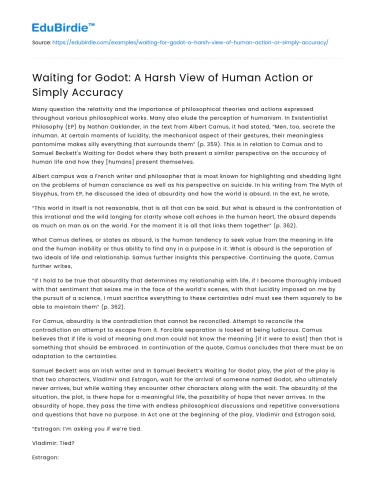Many question the relativity and the importance of philosophical theories and actions expressed throughout various philosophical works. Many also elude the perception of humanism. In Existentialist Philosophy (EP) by Nathan Oaklander, in the text from Albert Camus, it had stated, “Men, too, secrete the inhuman. At certain moments of lucidity, the mechanical aspect of their gestures, their meaningless pantomime makes silly everything that surrounds them” (p. 359). This is in relation to Camus and to Samuel Beckett's Waiting for Godot where they both present a similar perspective on the accuracy of human life and how they [humans] present themselves.
Albert campus was a French writer and philosopher that is most known for highlighting and shedding light on the problems of human conscience as well as his perspective on suicide. In his writing from The Myth of Sisyphus, from EP, he discussed the idea of absurdity and how the world is absurd. In the ext, he wrote,
“This world in itself is not reasonable, that is all that can be said. But what is absurd is the confrontation of this irrational and the wild longing for clarity whose call echoes in the human heart, the absurd depends as much on man as on the world. For the moment it is all that links them together” (p. 362).
What Camus defines, or states as absurd, is the human tendency to seek value from the meaning in life and the human inability or thus ability to find any in a purpose in it. What is absurd is the separation of two ideals of life and relationship. Samus further insights this perspective. Continuing the quote, Camus further writes,
“If I hold to be true that absurdity that determines my relationship with life, if I become thoroughly imbued with that sentiment that seizes me in the face of the world’s scenes, with that lucidity imposed on me by the pursuit of a science, I must sacrifice everything to these certainties adnI must see them squarely to be able to maintain them” (p. 362).
For Camus, absurdity is the contradiction that cannot be reconciled. Attempt to reconcile the contradiction an attempt to escape from it. Forcible separation is looked at being ludicrous. Camus believes that if life is void of meaning and man could not know the meaning [if it were to exist] then that is something that should be embraced. In continuation of the quote, Camus concludes that there must be an adaptation to the certainties.
Samuel Beckett was an Irish writer and In Samuel Beckett’s Waiting for Godot play, the plot of the play is that two characters, Vladimir and Estragon, wait for the arrival of someone named Godot, who ultimately never arrives, but while waiting they encounter other characters along with the wait. The absurdity of the situation, the plot, is there hope for a meaningful life, the possibility of hope that never arrives. In the absurdity of hope, they pass the time with endless philosophical discussions and repetitive conversations and questions that have no purpose. In Act one at the beginning of the play, Vladimir and Estragon said,
“Estragon: I’m asking you if we’re tied.
Vladimir: Tied?
Estragon: Ti-ed.
Vladimir: How do you mean tied?
Estragon: Down
Vladimir: But to whom? By Whom?
Estragon: To your man
Vladimir: To Godot? Tied to Godot! What an idea! No question of it.
For the moment” (p. 17).
Throughout the play, they continue to wait for a person the name of Godot, whom they think is named Godot. In spite of all their waiting, Vladimir and Estragon are not even sure if Godot exists. However, the two men still force themselves into the belief that Godot will one day come and save them. At the end of Act 2 towards the end of the play, they say,
Estragon: I can’t go on like this
“Vladimir: That’s what you think
Estragon: If we pated? That might be better for us.
Vladimir: We’ll hang ourselves to-morrow. Unless Godot comes.
Estragon: And if he comes?
Vladimir: We’ll be saved” (p. 109).
When looking at Estragon and Vladimir and their wait and hope, what Beckett’s play is, is an “allegory” of modern man’s wait for personal salvation. In order to achieve their goals, individuals must take action instead of waiting for fulfillment to arrive on their own. As Vladimir says, “There’s man for you, blaming his boots the fault of his feet.” The absurdity is having hope on the other than yourself and then blaming the other and not yourself and lacking the effort in doing so.
Camus’ discussion and Beckett’s “performance” present simple accuracy on how and what humans expect from the world and others; attempting to find the answer from another rather oneself only. What was similarly expressed in Camus and Beckett’s work is talking about suicide. At the end of Waiting for Godot, the characters proposed suicide if Godot were to not show up and in The Myth of Sisyphus, Camus defined suicide as a “serious philosophical problem”. For Camus, as expressed from Beckett, is that killing oneself amounts to confessing to the absence of a reason for living and if you cannot find that hope. This thought is common to be experienced amongst suicide along with other reasons alongside it. Camus’ means by absurd is seeking the value of human life and the ability to finding the purpose in it, if there is any. How that is represented in Beckett’s play is that the characters, Vladimir and Estragon, are attempting to find this person named Godot and finding this person means finding ultimate truth and having life-purpose. What Camus was trying to get at, in regards to Beckett, is that Godot [purpose or whatever else] is something that has to be found within themselves.






 Stuck on your essay?
Stuck on your essay?

